Pas de biographie disponible.
Compositeur Musique additionelle Librettiste Parolier Metteur en scène Chorégraphe Producteur création Producteur version
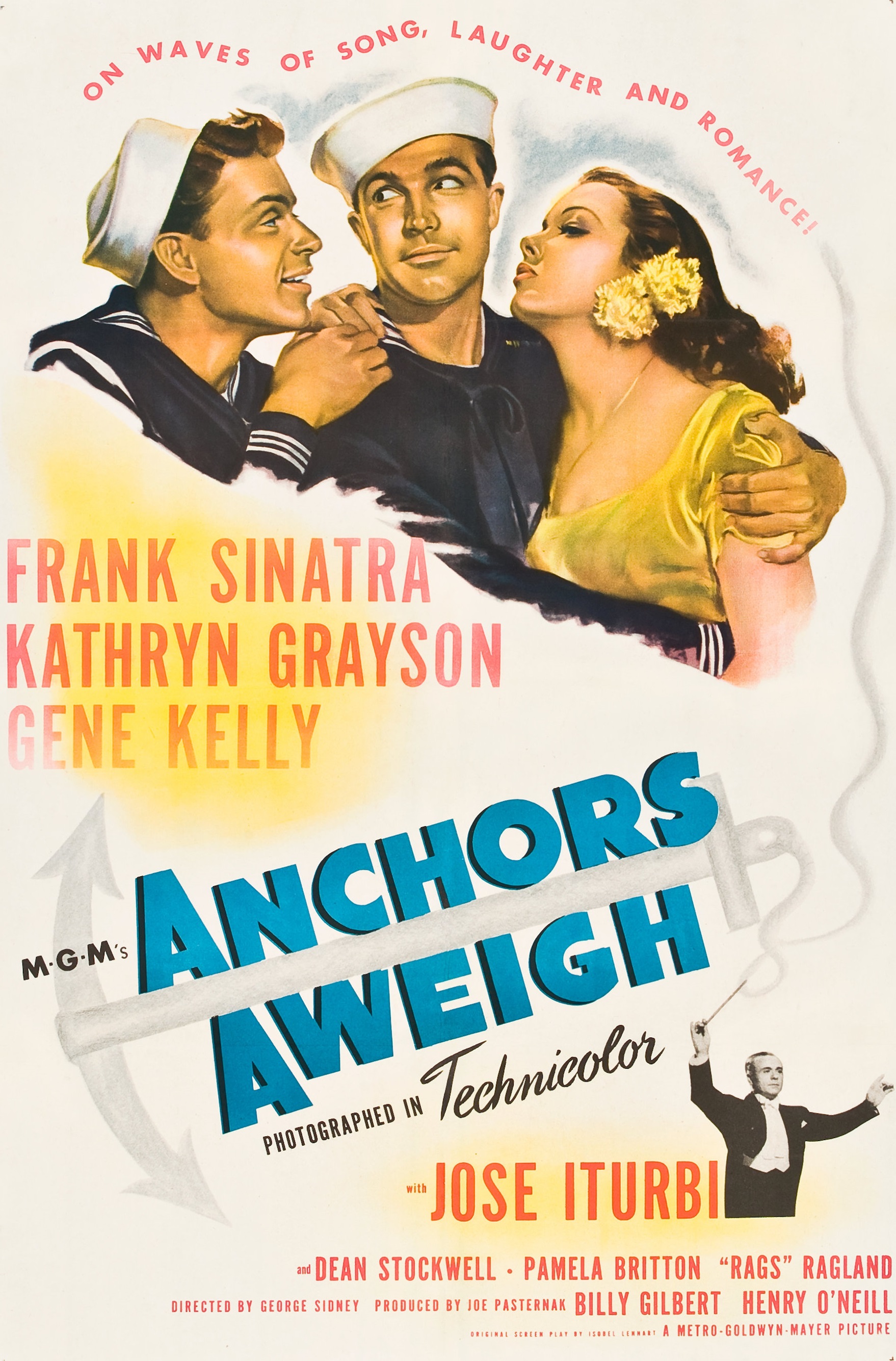
Version 1
Anchors Aweigh (1945-07-Film)
Type de série: FilmThéâtre: *** Film (*** - ***) Durée : Nombre : Première Preview : Thursday 19 July 1945Première : Thursday 19 July 1945Dernière : InconnuMise en scène : George Sidney • Chorégraphie : Producteur : Avec : Frank Sinatra (Clarence "Brooklyn" Doolittle), Kathryn Grayson (Susan Abbott), Gene Kelly (Joseph "Joe" Brady), José Iturbi (lui-même), Dean Stockwell (Donald Martin), Pamela Britton (Girl from Brooklyn), "Rags" Ragland (Police Sergeant), Billy Gilbert (Café Manager), Henry O'Neill (Admiral Hammond), Carlos Ramirez (Carlos), Grady Sutton (Bertram Kraler), Leon Ames (Admiral's Aide), Sharon McManus (Little Girl Beggar), Tom and Jerry (eux-mêmes – la voix de Jerry est celle de Sara Berner)), Charles Coleman (Butler (non crédité au générique)), Lester Dorr (Assistant Director (non crédité au générique))
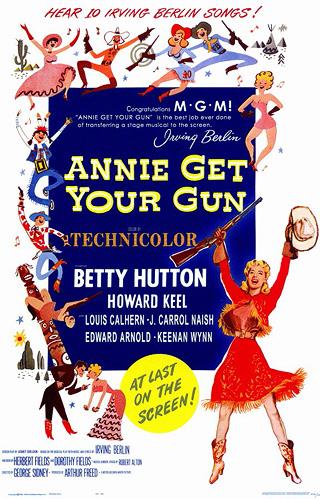
Version 2
Annie get your gun (1950-05-Film)
Type de série: OriginalThéâtre: *** Film (*** - ***) Durée : Nombre : Première Preview : InconnuPremière : Wednesday 17 May 1950Dernière : Wednesday 17 May 1950Mise en scène : George Sidney • Chorégraphie : ???? ???? • Producteur : Commentaires longs: Le film de 1950 "Annie Get Your Gun" est vite devenu une légende, même avant sa sortie. On s'est demandé qui hériterait du rôle qu'Ethel Merman avait rendu célèbre à Broadway en 1946. La MGM avait d'abord choisi Judy Garland, mais sa consommation de drogues et d'alcool ont poussé les producteurs à la remplacer par Betty Hutton. Heureusement, la claire et cuivrée Hutton brille dans cette fiction largement inspirée de la vie de Annie Oakley, la tireuse d'élite qui devint célèbre dans le Buffalo Bill's Wild West Show er gagna le cœur de Frank Butler, joué par Howard Keel. Le bariton Keel commençait sa carrière comme k'un des actuers principaux de la MGM dans les années '50 ("Seven Brides for Seven Brothers" et "Kiss Me, Kate"). Ensemble ils font merveille dans les hits de Irving Berlin "Doin' What Comes Naturally," "Anything You Can Do," "They Say It's Wonderful," "I Got the Sun in the Morning," et le classique "There's No Business Like Show Business."
"Annie Get Your Gun" est sans conteste un produit des années '50. Le chauvinisme inclassable de Keel et le côté servile de Hutton deviennent vite fatigant (bien qu'elle lui résiste dans une guerre des sexes), les indiens portent tous des plumes et ont le visage peint, disent "Ugh" … Au nom du poltiquement correct, dans le revival de Broadway de 1999 avec Bernadette Peters supprima "I'm an Indian Too", ce qui fut fort critiqué par les puristes. Blague à part, l'excellent cast et une partition immortelle fait d'Annie Get Your Gun un classique des musical.
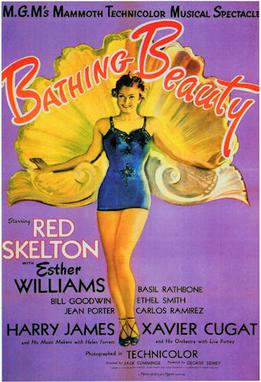
Version 3
Bathing Beauty (1944-06-Film)
Type de série: OriginalThéâtre: *** Film (*** - ***) Durée : Nombre : Première Preview : Tuesday 27 June 1944Première : Tuesday 27 June 1944Dernière : InconnuMise en scène : George Sidney • Chorégraphie : Producteur : Avec : Red Skelton (Steve Elliot), Esther Williams (Caroline Brooks), Basil Rathbone (George Adams), Bill Goodwin (Professor Willis Evans), Jean Porter (Jean Allenwood), Nana Bryant (Dean Clinton), Carlos Ramírez (Himself), Ethel Smith (Ethel Smith - Music Teacher), Lina Romay (Herself), Helen Forrest (Herself - Singer with Harry James and His Music Makers), Donald Meek (Chester Klazenfrantz), Jacqueline Dalya (Maria Dorango), Francis Pierlot (Professor Hendricks), Ann Codee (Mme. Zarka), Margaret Dumont (Mrs. Allenwood), Bunny Waters (Bunny), Janis Paige (Janis), Xavier Cugat (Himself - Leader of Xavier Cugat and His Orchestra), Harry James (Himself - Leader of Harry James and His Music Makers), Dorothy Adams (Miss Hanney - Faculty Secretary), Jane Isbell (Western Union Girl)
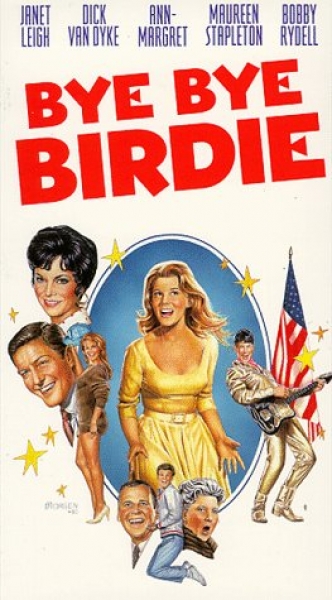
Version 4
Bye Bye Birdie (1963-04-Film)
Type de série: FilmThéâtre: *** Film (*** - ***) Durée : Nombre : Première Preview : Thursday 04 April 1963Première : Thursday 04 April 1963Dernière : Thursday 04 April 1963Mise en scène : George Sidney • Chorégraphie : Producteur : Commentaires longs: Director George Sidney was so taken with the talent of Ann-Margret that when the film was edited he went to Columbia's executives and proposed the opening and closing bumpers that would showcase her. They refused to pay for any additional filming so Sidney rented the studio and crew at his own expense. He then asked the composers to come up with a title song. Ann-Margret's skirt-flipping/hair-tossing rendition of the song was filmed six months after principal photography was completed at a cost of $60,000, which was repaid to Sidney after the movie, and Ann-Margret, became a sensation.
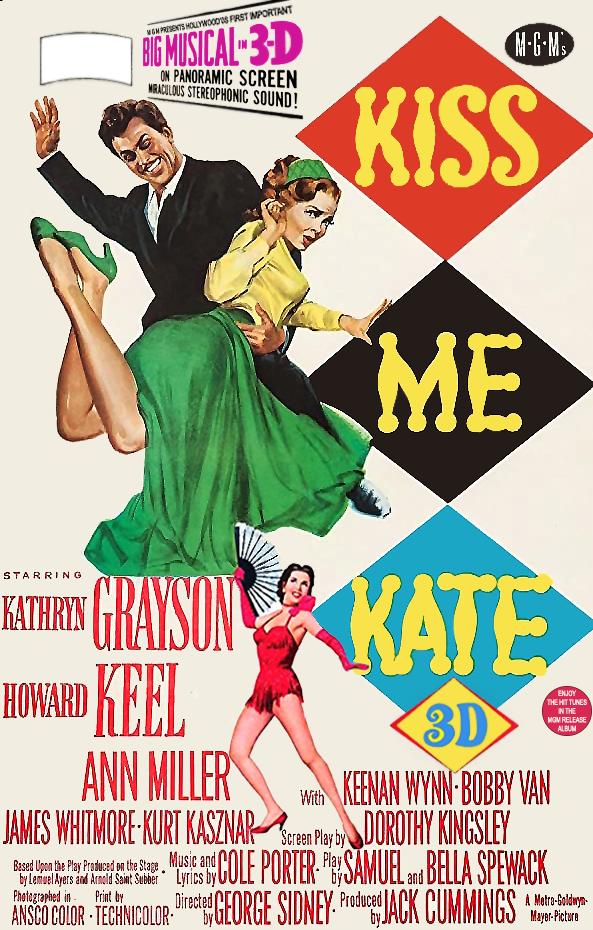
Version 5
Kiss me Kate (1953-11-Film)
Type de série: FilmThéâtre: *** Film (*** - ***) Durée : Nombre : Première Preview : Thursday 26 November 1953Première : Thursday 26 November 1953Dernière : InconnuMise en scène : George Sidney • Chorégraphie : Producteur : Avec : Kathryn Grayson (Lilli Vanessi 'Katherine'), Howard Keel (Fred Graham 'Petruchio'), Ann Miller (Lois Lane 'Bianca'), Keenan Wynn (Lippy), Bobby Van ('Gremio'), Tommy Rall (Bill Calhoun 'Lucentio'), James Whitmore (Slug), Kurt Kasznar ('Baptista'), Bob Fosse ('Hortensio'), Ron Randell (Cole Porter), Willard Parker (Tex Callaway), Dave O'Brien (Ralph), Claud Allister (Paul), Ann Codee (Suzanne), Carol Haney (Specialty Dancer), Jeanne Coyne (Specialty Dancer), David Bair (Gregory (uncredited)), Herman Belmonte (Actor in Play (uncredited)), Lulu Mae Bohrman (Audience Member (uncredited)), Ralph Brooks (Audience Member (uncredited)), Dick Cherney (Actor in Play (uncredited)), Gene Coogan (Audience Member (uncredited)), Michael Dugan (Stretcher Bearer (uncredited)), Ted Eckelberry (Nathaniel (uncredited)), Kay Garrett (Audience Member (uncredited)), Herschel Graham (Audience Member (uncredited)), Maria Haro (Actress in Play (uncredited)), Sam Harris (Audience Member (uncredited)), Al Haskell (Actor in Play (uncredited)), Bill Hickman (Audience Member (uncredited)), Mitchell Lewis (Stage Doorman (uncredited)), Wilbur Mack (Audience Member (uncredited)), Maurice Marks (Actor in Play (uncredited)), Philo McCullough (Audience Member (uncredited)), Hans Moebus (Audience Member (uncredited)), Hermes Pan (Sailor (uncredited)), Mitchell Rhein (Actor in Play (uncredited)), Stephen Soldi (Actor in Play (uncredited)), William Tannen (Taxi Driver (uncredited))
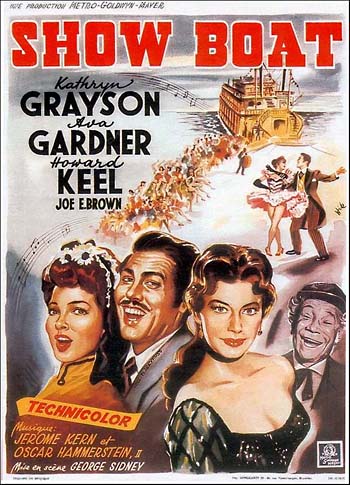
Version 6
Show Boat (1951-07-Film)
Type de série: FilmThéâtre: *** Film (*** - ***) Durée : Nombre : Première Preview : InconnuPremière : Tuesday 17 July 1951Dernière : InconnuMise en scène : George Sidney • Chorégraphie : Producteur : Avec : Magnolia Hawks ... Kathryn Grayson / Gaylord Ravenal ... Howard Keel / Julie LaVerne ... Ava Gardner / Cap'n Andy Hawks ... Joe E. Brown / Ellie May Shipley ... Marge Champion / Frank Schultz ... Gower Champion / Steven Baker ... Robert Sterling / Parthy Hawks ... Agnes Moorehead / Pete ... Leif Erickson / Joe ... William Warfield / Julie LaVerne (singing) ... Annette WarrenCommentaires longs: The 1951 film version of Show Boat was adapted from the original 1927 stage musical by John Lee Mahin after Jack McGowan and George Wells had turned in two discarded screenplays, and was directed by George Sidney. Filmed in the typical MGM lavish style, this version is the most financially successful of the film adaptations of the play: one of MGM's most popular musicals, it was the third most profitable film of 1951.
Although arguably one of the studio's less inventive film musicals, the film is more overtly cinematic than the 1936 version — the boat is seen winding its way down the river several times, and there are two scenes in which the boat is shown leaving the dock, while the 1936 film version is so faithful in following the stage play that the boat is seen moving only at the very beginning of the film, when it arrives at a river town.
The staging of several of the songs is more elaborate than in the 1936 version.
In the 1936 film, Magnolia and Ravenal sing the song "Make Believe" just as they do in the stage version of the musical, with Ravenal standing on a river piling and Magnolia standing on the upper deck of the boat, in the manner of the Romeo and Juliet balcony scene. He does not even enter the boat until during the later "miscegenation" scene, just as he does in the stage version. In the 1951 film, Ravenal climbs on board the boat as soon as he first walks up to it, and then meets Magnolia for the first time. He follows her to the upper deck to sing the song, and the two walk around the deck while singing the last few lines.
When Julie and several other characters sing "Can't Help Lovin' Dat Man" in the 1936 film, they sing it inside the boat, in the kitchen, (just as in the stage version) with only the last moments of the song being sung on the deck. In the 1951 film, the song is sung entirely on the ship's upper deck, taking full advantage of the surrounding scenery. The boat's kitchen is never shown in the 1951 film.
In the 1936 film, just as in the stage version, Joe and the other dock workers sing "Ol' Man River" while sitting on crates and cotton bales on the levee, and the song is made cinematic through the use of an elaborate expressionistic montage of levee workers performing their tasks. In the 1951 film, Joe sings one refrain of the song while standing on the levee and then walking to the dock, and the last part of the song is sung by Joe standing on the boat's lower deck as it winds its way down the river, accompanied by an offscreen chorus.
In the 1936 film, when Julie sings "Bill", she stands next to a piano and never changes her position. (She sat on top of the piano in the stage version.) In the 1951 film, Julie walks around the piano while singing it and leans against the steps of the Trocadero nightclub to sing part of the song.
However, in the 1936 film, the staging of the show boat parade in the opening scenes was more elaborate than in the 1951 version. In the 1951 version, the parade members (as well as the actors) stay on the dock, while in the 1936 version, the parade is shown marching down the main street of the town, a huge set constructed by the Universal Pictures craftsmen. The introduction of the show boat company to the crowd is also held there.
The 1951 film was the first film version of Show Boat not to feature Robert Russell Bennett's stage orchestrations in one form or another (the orchestrations in this film were done by Conrad Salinger, Alexander Courage, and the uncredited Robert Franklyn).